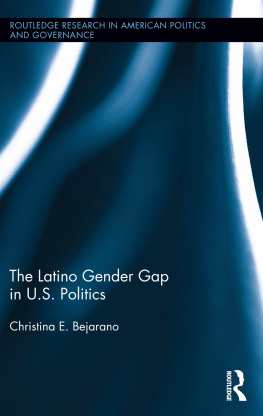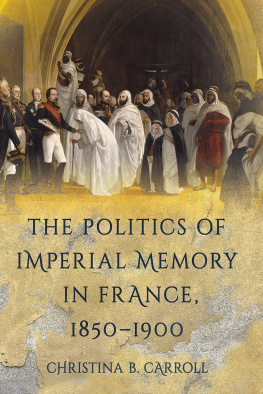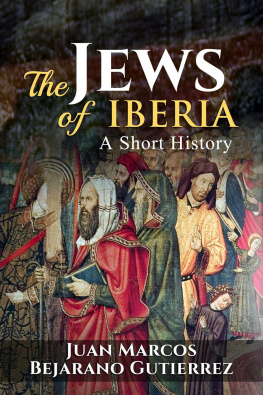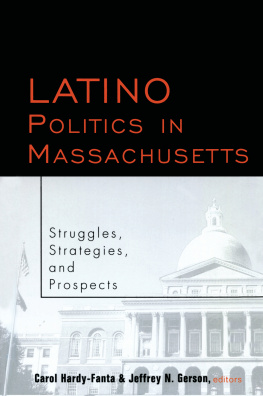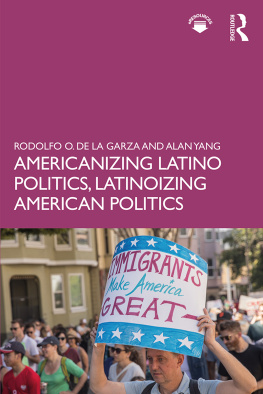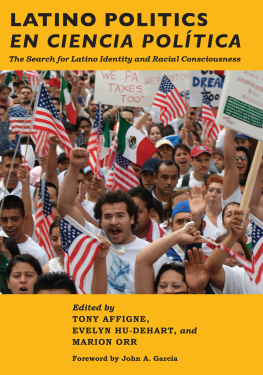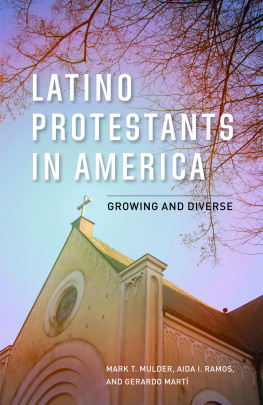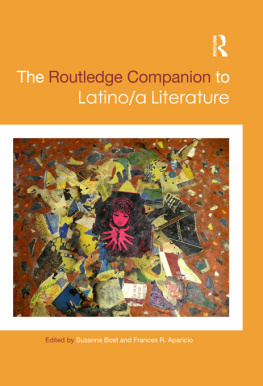Understanding the dynamics underlying the voting behavior and participation of Latinos has never been more crucial, and Christina E. Bejarano provides by far the most comprehensive examination to date of gender differences in the political behavior of the Latino electorate. This book is essential reading for political practitioners, academics, and indeed anyone who wants to understand how the preferences and attitudes of Latinas are likely to influence the future of American politics.
Susan J. Carroll, Rutgers University
This very timely work by Christina E. Bejarano represents a major contribution to the body of knowledge in American politics. Both scholars and students who study Political Behavior, Women in Politics, Latino Politics, Race, Ethnicity and Politics, Public Opinion, and American Political Parties will greatly benefit from this systematic assessment of the differences and similarities in the attitudes and behaviors of Hispanic women and men. Bejarano carefully pulls together qualitative and quantitative data from multiple sources to reveal every facet of the growing Latina/o political gender gap. Politicians at every level of government also need to read this book if they want to anticipate the future of American politics.
Valerie Martinez-Ebers, University of North Texas
The Latino Gender Gap in U.S. Politics
Many questions remain unanswered about the observable differences in voting behavior, partisanship, and cultural attitudes among men and women. Latino political participation in the United States is generally lower than the rest of the population, mainly due to their high proportion of youth and foreign born populations that are ineligible to vote. This dynamic is slowing changing, partly as a result of the rapidly growing Latino population in the United States.
This book delves deeper into the complex gender differences for Latino political behavior. More specifically, it is a political analysis of the diverse U.S. Latino population and the interacting factors that can influence male and female differences in voting and policy attitudes. Christina E. Bejarano carefully unpacks more aspects of the gender category for Latinos, including analyzing the gender differences in Latino political behavior across national origin, foreign born status, and generational status.
The Latino gender gap can have far-reaching political implications on electoral politics. As the Latino population highlights their growing political sway, the major political parties have and will strategically mobilize and court the Latino electorate, Latinas in particular.
Christina E. Bejarano is an Associate Professor of Political Science at the University of Kansas. She received her B.A. from the University of North Texas, and her Ph.D. and M.A. from the University of Iowa. Her research and teaching interests are in American politics, particularly areas of gender, race/ethnicity, and political behavior. She focuses on Latino political candidates and voters in U.S. electoral politics. She is the author of The Latina Advantage: Gender, Race, and Political Success (Texas, 2013).
Routledge Research in American Politics and Governance
1 Lobbying the New President
Interests in Transition
Heath Brown
2 Religion, Race, and Barack Obamas New Democratic Pluralism
Edited by Gastn Espinosa
3 Direct Democracy in the United States
Petitioners as a Reflection of Society
Edited by Shauna Reilly and Ryan M. Yonk
4 American Exceptionalism in the Age of Obama
Stephen Brooks
5 An Empire of Ideals
The Chimeric Imagination of Ronald Reagan
Justin D. Garrison
6 Resisting Injustice and the Feminist Ethics of Care in the Age of Obama
Suddenly, All the Truth Was Coming Out
David A.J. Richards
7 Interfaith Advocacy
The Role of Religious Coalitions in the Political Process
Katherine E. Knutson
8 Social Contract Theory in American Jurisprudence
Too Much Liberty and Too Much Authority
Thomas R. Pope
9 Voting and Migration Patterns in the U.S.
George Hawley
10 Democracy, Intelligent Design, and Evolution
Science for Citizenship
Susan P. Liebell
11 Inventive Politicians and Ethnic Ascent in American Politics
The Uphill Elections of Italians and Mexicans to the U.S. Congress
Miriam Jimnez
12 Competitive Elections and Democracy in America
The Good, the Bad, and the Ugly
Heather K. Evans
13 Gender, Race, and Office Holding in the United States
Representation at the Intersections
Becki Scola
14 The Latino Gender Gap in U.S. Politics
Christina E. Bejarano
The Latino Gender Gap in U.S. Politics
Christina E. Bejarano
First published 2014
by Routledge
711 Third Avenue, New York, NY 10017
and by Routledge
2 Park Square, Milton Park, Abingdon, Oxon OX14 4RN
Routledge is an imprint of the Taylor & Francis Group, an informa business
2014 Taylor & Francis
The right of Christina E. Bejarano to be identified as author of this work has been asserted in accordance with sections 77 and 78 of the Copyright, Designs and Patents Act 1988.
All rights reserved. No part of this book may be reprinted or reproduced or utilized in any form or by any electronic, mechanical, or other means, now known or hereafter invented, including photocopying and recording, or in any information storage or retrieval system, without permission in writing from the publishers.
Trademark Notice: Product or corporate names may be trademarks or registered trademarks, and are used only for identification and explanation without intent to infringe.
Library of Congress Cataloging-in-Publication Data
Bejarano, Christina E., 1980
The Latino gender gap in U.S. politics / Christina E. Bejarano.
pages cm. (Routledge research in American politics and governance; 14)
1. Hispanic AmericansPolitics and government. 2. Political participationSex differencesUnited States. 3. Gender identity Political aspectsUnited States. 4. United StatesEthnic relations Political aspects. I. Title.
E184.S75B44 2014
323.1168'073dc23
2013035220
ISBN: 978-0-415-85431-3 (hbk)
ISBN: 978-0-203-74443-7 (ebk)
Typeset in Sabon
by Apex CoVantage, LLC
I dedicate this work to my inspiring cousin Morgan. She has faced some of lifes toughest obstacles, but continues to rise above them with grace, humor, and strength. She continues to put lifes challenges into perspective.
The journey of a thousand miles begins with a single step.
Lao-tzu
Contents
This project began in 2007 with my participation at the Latino National Survey Junior Scholar Research Conference. This provided the opportunity to start working with the 2006 Latino National Survey (LNS) dataset. I benefited from the feedback and advice of a group of junior and senior scholars at the conference, including the LNS principal investigators.
I appreciate the support and feedback from my fellow Latino politics and Racial/Ethnic politics scholars, especially members of the Latino caucus in political science. Im especially appreciative of: Matt Barreto, Michael Jones-Correa, Rodney Hero, Valerie Martinez-Ebers, Jane Junn, Adrian Pantoja, Rene Rocha, Anna Sampaio, Gabe Sanchez, and Gary Segura.


